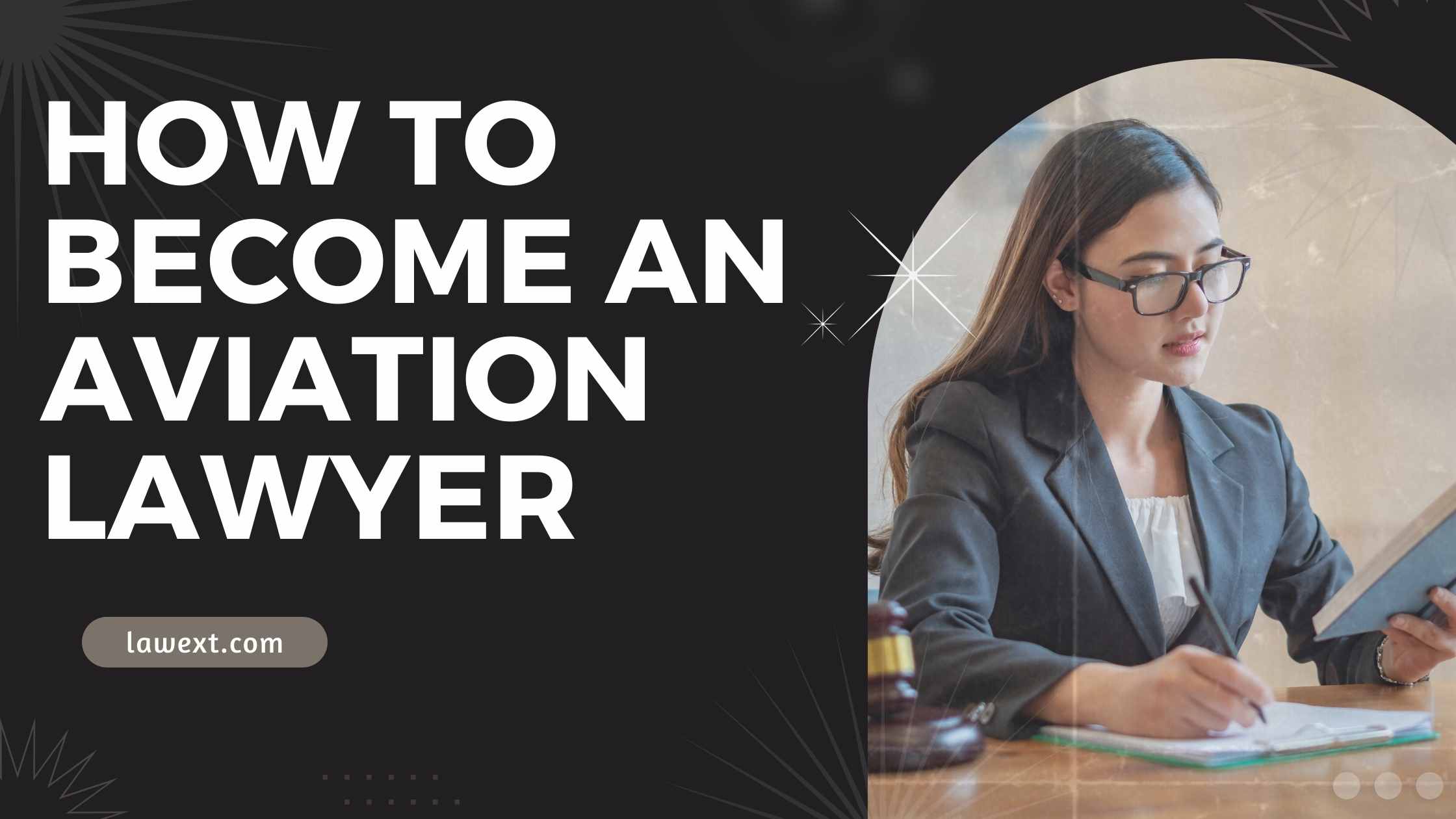How to Become an Aviation Lawyer?

How to Become an Aviation Lawyer? To become an aviation lawyer, you must complete a law degree and specialize in aviation law through relevant internships or courses. This field requires a deep understanding of aviation regulations and legal processes related to aircraft accidents, insurance claims, and airline regulations.
Table of Contents
Additionally, networking within the aviation industry and staying updated on any advancements or changes in aviation law can help establish a successful career as an aviation lawyer.

Credit: shunnarah.com
Becoming An Aviation Lawyer
If you have a passion for aviation and the law, then becoming an aviation lawyer might be the perfect career path for you. Aviation law deals with legal issues related to air travel, including regulations, safety, and liability. This specialized field requires a combination of education, practical experience, and specialized knowledge. To embark on this exciting journey, you need to follow a few important steps.
To become an aviation lawyer, you must start by earning a law degree. This typically involves completing a Bachelor’s degree in a relevant field and then pursuing a Juris Doctor (JD) degree from an accredited law school. During your legal education, it is beneficial to take courses that focus on aviation law or related subjects, such as contract law, tort law, and administrative law. These courses will help you develop a strong foundation in legal principles
Once you have obtained your JD degree, you will need to pass the bar exam in the jurisdiction where you plan to practice law. Each state or country has its own requirements and examination process. Passing the bar exam demonstrates your proficiency in the law and qualifies you to practice.
After completing your formal education, gaining practical experience in the field of aviation law is the next crucial step in becoming an aviation lawyer. One way to gain this experience is by working for law firms that specialize in aviation law. These firms often offer internships or entry-level positions that allow you to work on aviation-related cases and learn from experienced attorneys.
Another avenue to gain practical experience is by working for government agencies or organizations related to aviation, such as the Federal Aviation Administration (FAA) or the International Civil Aviation Organization (ICAO). These entities handle a wide range of legal matters within the aviation industry and provide valuable insight into the regulatory framework.
In addition to gaining practical experience, developing specialized knowledge in aviation law is essential to succeed in this field. Aviation law encompasses a wide range of legal issues, including aviation accidents, insurance, pilot licensing, and airline liability. To become an expert in these areas, it is beneficial to engage in continuous learning and stay updated on the latest developments in the aviation industry.
Attending seminars, conferences, and workshops related to aviation law can provide valuable insights and networking opportunities. Additionally, joining professional organizations and associations, such as the American Bar Association’s Forum on Air and Space Law, can connect you with other aviation lawyers and keep you informed of industry trends.
In conclusion, to become an aviation lawyer, you need to pursue a law degree, gain practical experience through internships or work for law firms or aviation-related organizations, and develop specialized knowledge in aviation law. By following these steps, you can pave your way toward a rewarding career in this exciting field.

Credit: www.bizjournals.com
Education And Qualifications
To become an aviation lawyer, one must possess the requisite education and qualifications. This involves undergoing specific legal education and obtaining relevant qualifications to specialize in aviation law. Below, we explore the necessary steps and requirements to achieve this goal.
Earning A Law Degree
Earning a law degree is the first crucial step toward becoming an aviation lawyer. Prospective lawyers should pursue a Bachelor’s degree in any field of study to enter law school.
- Select a reputable law school recognized for its strong aviation law program.
- Complete a Juris Doctor (J.D.) degree, which typically takes three years of rigorous study and training.
- Participate in internships or externships focusing on aviation law to gain practical experience.
Specializing In Aviation Law
To specialize in aviation law, aspiring lawyers can choose from various paths. After obtaining a J.D. degree, they can pursue the following routes:
- Acquire certifications or advanced degrees specifically related to aviation law, which can enhance their knowledge and expertise in the field.
- Join aviation law associations or organizations to network with professionals in the industry and stay updated on the latest developments in aviation law.
- Seek mentorship from established aviation lawyers to gain valuable insights and guidance in navigating the complexities of aviation law.
Gaining Practical Experience
When it comes to becoming an aviation lawyer, gaining practical experience is essential. This hands-on experience ensures that you have a solid foundation and understanding of the field. There are two primary ways to gain practical experience: through internships and externships, and by joining aviation law organizations.
Internships And Externships
Internships and externships are a valuable way to gain real-world experience in the aviation law field. These opportunities allow you to work alongside experienced professionals, gaining insights into the day-to-day responsibilities and challenges of an aviation lawyer. Here are some key points to consider:
- Apply for internships or externships at law firms specializing in aviation law.
- Internships generally take place during the summer or school breaks, while externships can be part-time during the academic year.
- During your internship or externship, make the most of the opportunities available to you. Ask questions, seek guidance, and absorb as much knowledge as possible from experienced lawyers.
- Network with professionals within the firm and attend relevant events to expand your connections in the aviation law industry.
- Keep a record of the tasks you have completed and the skills you have gained. This will be valuable for future job applications and interviews.
Joining Aviation Law Organizations
Joining aviation law organizations is another excellent way to gain practical experience and expand your network within the field. By becoming a member of these organizations, you can benefit from:
- Access to workshops, seminars, and conferences that focus on aviation law topics.
- The chance to connect with other professionals in the field, including experienced aviation lawyers.
- Opportunities to volunteer in aviation-related projects, which can further enhance your understanding of the industry.
- Access to exclusive resources, publications, and research materials that can help you stay updated with the latest developments in aviation law.
- Mentorship programs or mentor matching, where you can receive guidance and advice from seasoned aviation lawyers.
By actively participating in aviation law organizations, you can gain valuable insights, expand your knowledge, and establish connections that may open doors to future opportunities.
Developing Specialized Knowledge
Develop specialized knowledge in order to become an aviation lawyer by pursuing relevant education, gaining practical experience, and staying updated with industry regulations and laws.
Introduction: Developing Specialized Knowledge
Developing specialized knowledge is a crucial step toward becoming an aviation lawyer. Aviation law is a highly specialized field that requires a deep understanding of both legal principles and the intricacies of the aviation industry. By gaining specialized knowledge, aspiring aviation lawyers can position themselves as experts in the field, opening up opportunities for exciting and rewarding career paths. In this article, we will explore two key ways to develop specialized knowledge as an aviation lawyer: attending aviation law conferences and engaging in continuing legal education.
Attending Aviation Law Conferences
Attending aviation law conferences is an excellent way for aspiring aviation lawyers to stay updated on the latest developments in the industry while also expanding their network of contacts. These conferences bring together legal experts, industry professionals, and government regulators, creating a platform for knowledge exchange and meaningful discussions.
During these conferences, attendees have the opportunity to hear from leading aviation lawyers, policymakers, and experts. They can attend sessions focused on various aspects of aviation law, such as international regulations, litigation trends, and emerging technologies. By participating in these sessions, aspiring aviation lawyers can gain valuable insights into the current challenges and best practices in the field.
Furthermore, aviation law conferences offer networking opportunities that can be invaluable for career growth. By connecting with experienced aviation lawyers and industry professionals, aspiring lawyers can build relationships that may lead to mentorship opportunities, job referrals, or collaborations on future projects.
Engaging In Continuing Legal Education
Engaging in continuing legal education is another essential step for developing specialized knowledge as an aviation lawyer. To maintain their legal licenses, lawyers are often required to complete a certain number of continuing education credits each year. By investing time in courses, workshops, and seminars specifically focused on aviation law, aspiring aviation lawyers can enhance their understanding of the field and stay current with legal developments.
Continuing legal education programs often cover a wide range of aviation law topics, including air safety regulations, airline liability issues, and drone regulations. These programs provide participants with the opportunity to delve deeper into specific areas of aviation law, developing a comprehensive understanding of the complex legal issues that arise in the aviation industry.
Moreover, continuing legal education can also serve as a platform for aspiring aviation lawyers to interact with legal experts and industry practitioners. Instructors often bring real-world experiences into the classroom, sharing insights and practical tips that can be invaluable for future aviation law practitioners.
In conclusion, attending aviation law conferences and engaging in continuing legal education are two effective ways for aspiring aviation lawyers to develop specialized knowledge in the field. By investing in these activities, individuals can gain a competitive edge, positioning themselves for success in the exciting world of aviation law.
Building A Career As An Aviation Lawyer
Welcome to the world of aviation law, a dynamic and captivating field that offers a unique blend of legal expertise and a passion for aviation. Building a career as an aviation lawyer requires dedication, specialized knowledge, and a strategic approach to professional growth. In this blog post, we’ll explore the essential steps for aspiring lawyers to establish themselves in the aviation industry and carve out a successful career path.
Networking And Building Connections
Networking plays a crucial role in the career journey of an aviation lawyer.It provides opportunities for professional growth, mentoring, and access to valuable resources. Building connections within the aviation industry can open doors to exciting career prospects and create a supportive network of peers. Attending industry events, seminars, and conferences enables aspiring aviation lawyers to establish meaningful connections with industry professionals and gain insights into the legal nuances of aviation.
Seeking Job Opportunities
Seeking job opportunities in the aviation law sector involves proactive research and strategic planning.It’s essential to Stay updated with available openings and law firms specializing in aviation law. Leveraging online job platforms and legal recruitment agencies can provide aspiring aviation lawyers with access to a wide range of job opportunities. Crafting a compelling resume and cover letter that highlights relevant skills and experiences is crucial when applying for roles in the aviation law field.
Advancing In The Field
Advancing in the field of aviation law entails continuous learning and professional development.Continual education in aviation law through specialized courses and certifications enables lawyers to stay abreast of legal developments within the aviation industry. Seeking out mentorship opportunities with experienced aviation lawyers and participating in professional associations can further advance a lawyer’s expertise in aviation law.Building a strong reputation and establishing expertise in aviation law can lead to rewarding career advancements and leadership roles within the industry.
Conclusion
Becoming an aviation lawyer requires dedication, specialized knowledge, and a passion for aviation law. By pursuing the required education, gaining relevant experience, and cultivating a strong network within the industry, individuals can pave their way towards a successful career in aviation law.
Embracing these steps could lead to a fulfilling and impactful profession in the field.
Introducing Jonah Plum, a legal luminary whose journey through the corridors of justice has been intertwined with the eloquence of the written word. Born and raised in the vibrant city of Seattle, Washington, Jonah's early fascination with language and debate laid the foundation for a remarkable career in law.
Jonah's scholarly odyssey began at Harvard Law School, where they immersed themselves in the study of jurisprudence, honing their analytical prowess and legal acumen. Armed with a law degree, they entered the legal arena, navigating courtrooms and boardrooms with a fervor for justice. Yet, it was the realization of the transformative power of the written word that led Jonah to pivot from legal briefs to the world of blogging.
A digital advocate in the truest sense, Jonah recognized the need for demystifying legal concepts and making them accessible to a broader audience. This blog, a virtual repository of legal insights, transcends geographical boundaries, connecting with a global readership hungry for clarity amidst legal complexities.
Beyond the black letter of the law, Jonah delves into the human stories that underscore the legal landscape. Their writing goes beyond legal analysis, weaving narratives that humanize the law, shedding light on its impact on individuals and society.






